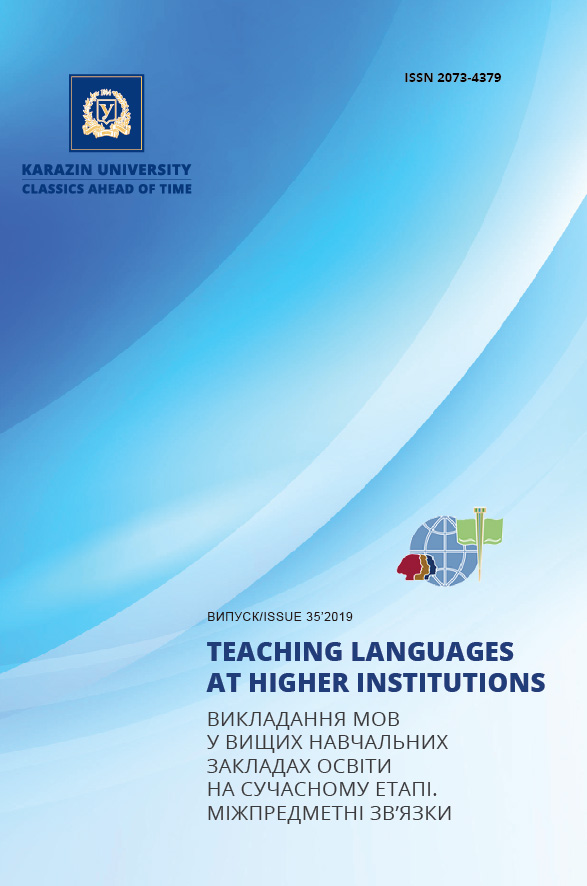Survey as a method of finding new knowledge in the process of philologists’ graduate research
Abstract
The article raises the issue of the use of empirical methods by foreign students of Philology in graduate studies. One of these methods – surveying – is considered as a method of finding the new knowledge that is the most important in the research work.
The article presents the rules for constructing questionnaires, which include the following: defining the purpose of the survey; adequacy of the questions to enable empirical verification of the hypothesis of the study; accounting for the awareness of the respondents of the subject matter; placement of the questions in accordance with the logic of perception of the questionnaire content; avoidance of suggestive emotionally colored words in the questions. According to the research of social psychologists, the author analyses the classifications of questions that may be part of the questionnaire and describes their purpose. The scientific novelty of the article is the presentation of the speech genres of the questionnaire and the description of its results. The author argues that the questionnaire as a text is a speech genre characterized by a certain content and semantic, stylistic and compositional unity. The content and semantic unity is provided by the content of the questionnaire; the stylistic unity is provided by the compliance with the features of scientific speech and the compositional unity is provided by placement of text components and connections between them.
Description of the results of the survey as a genre includes the following content elements: a) statement of the purpose of the survey; b) clarification of the place and time, and description of the respondents; c) presentation of the questionnaire structure (grouping of questions in thematic blocks intended to solve a single problem (if any); d) statement of the purpose of including a question into the questionnaire; d) description of what is received in response, and the conclusion of its possible meaning; e) generalizing conclusions based on the analysis of all answers to the questionnaire.
The description of the survey results corresponds to the scheme: the purpose of including a question in the questionnaire – results – their interpretation.
The article presents a system of tasks for the formation of question-making skills and ability to correlate the content of a questionnaire with the purpose of research; to compose a questionnaire as a speech genre; to eliminate errors in the content and language of a questionnaire; to describe the data obtained in a survey.
Downloads
References
Armstrong, K. and Retterer, O. (2008). Blogging as L2 writing: a case study. AACE Journal, 16 (3), pp. 233–251 [in English].
Boulton, F. and Perez-Paredes, P. (2014). Researching use of corpora for language teaching and learning. ReCALL. The Journal of EUROCALL, 26 (2), pp. 2456 [in English].
Burlachuk, L.F. and Morozov, S.M. (1989). Slovar-spravochnik po psihologicheskoj diagnostike [The dictionary-directory on psychological diagnostics]. Krymskij, S.B. (Ed.). Kiev: Naukova dumka [in Russian].
Butenko, I.A. (1989). Anketnyj oprosnik kak obshchenie sociologa s respondentami [The questionnaire as a sociologist’s communication with the respondents]. Moscow: Vysshaya shkola [in Russian].
Campoy, M.C., Belles-Fortuno, B. and Gea-Valor, M.L. (2010). Corpus-Based Approaches to English Language Teaching. London: Continuum [in English].
Druzhinin, V.N. (1997). Eksperimentalnaya psihologiya [Experimental psychology]. Moscow: INFRA-M [in Russian].
Gurevich, K.M. and Borisova, E.M. (Eds.). (2001). Psihologicheskaya diagnostika [Psychological diagnosis]. Moscow: Izd-vo URAO [in Russian].
Klimova, I.V. and Razomazova, A.L. (2005). Obshchij praktikum. Osnovy psihologicheskogo issledovaniya [General practicum. Fundamentals of psychological research]. Moscow: MELI [in Russian].
Kornilova, T.V. and Smirnova, S.D. (Eds.). (2002). Eksperimentalnaya psihologiya: Praktikum [Experimental psychology: Practicum]. Moscow: Aspekt Press [in Russian].
Krylov, A.A. (Ed.). (1987). Praktikum poobshchej i eksperimentalnoj psihologii [Practicum in General and experimental psychology]. Leningrad: Izd-vo LGU [in Russian].
Krylov, A.A. and Manichev, S.A. (Eds.). (2003). Praktikum po obshchej, eksperimentalnoj i prikladnoj psihologii [Practicum in general, experimental and applied psychology]. St. Petersburg: Piter [in Russian].
Slepenkova, I.M., Dryahlova, V.I. et al. (Eds.). (1992). Praktikum po sociologii [Practicum in sociology]. Moscow: Izd-vo MGU [in Russian].
Welker, A., White, G. (2013). Technology enhanced language learning: Connection theory and practice. Oxford: Oxford University Press [in English].

